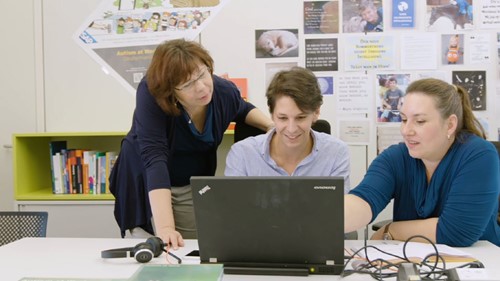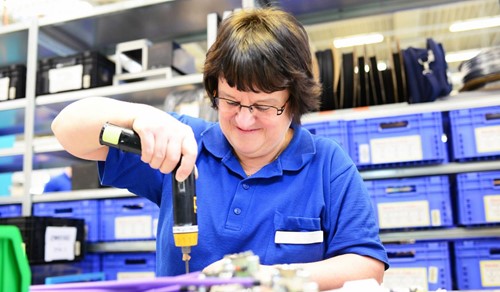Cheryl Madden is an Organisational Development and Learning Consultant at The Growth Company and Co-Chair of the Health and Wellbeing EDI Network and lead of the Mental Health Champion support group, Cheryl drives group-wide initiatives and campaigns to increase awareness and promote a healthy workplace.
Creating a disability-friendly workplace | World Autism Acceptance Week

World Autism Acceptance Week is an international opportunity for us all to increase understanding and acceptance of autism, and in acknowledgement of this, Skills for Growth SME Support have teamed up with our colleague Cheryl Madden, Organisational Development and Learning Consultant at The Growth Company, to teach business leaders how to create a disability friendly workplace. More than 4.4 million disabled Britons are in employment, and according to Beyond Autism, 21.7% of adults with autism in the UK are in paid work, so in this article we’ll highlight the techniques and skills you might need to allow all your employees to bring their whole selves to work each day.
What is autism?
Autism is a lifelong developmental condition that affects how a person communicates with and relates to, other people. It also affects how they make sense of the world around them. Without the right support, it can have a profound – sometimes devastating – effect on individuals and families.
It is a spectrum condition, which means that, while all people with autism share main areas of difficulty, their condition will affect them in different ways. Some people with autism are able to live independent lives but others may need a lifetime of specialist support.

How can employers become a disability friendly workplace?
Creating a diverse, inclusive workplace should be an important mission for all employers. Hiring people with disabilities isn’t enough though, retention is the key.
The five tips below are a good starting point to help you ensure you’re doing what you can to attract disabled applicants as well as ensure employees with disabilities feel fulfilled within their role:
- Build an awareness of disabilities in general
Promoting an inclusive culture will encourage your employees to learn more about disability inclusion as well as help them to understand their biases in general. Training and regular campaigns can help raise awareness and offer further insight with personal experiences of any challenges disabled people may have to overcome. If you’re unfamiliar with an employee’s disability, then you can find out more through free support and guidance available online including the Remploy Disability Guide.
- Champion best practice
As a Disability Confident Leader, The Growth Company continuously seeks ways to actively champion best practice and encourage other businesses to become Disability Confident. We mention reasonable adjustments in all our adverts and ensure a guaranteed interview for applicants who meet the minimum requirements and are also disabled. Companies can also start to build a robust recruitment pipeline in part by engaging with groups that support people with disabilities such as Breakthrough UK.
- Consider reasonable adjustments throughout the employee lifecycle
Disability friendly workplaces are more likely to ensure that their recruitment process has made reasonable adjustments for candidates with disabilities. This could be as simple as sharing questions in advance of an interview. Not only will these encourage more individuals with disabilities to apply, but it also increases your candidate pool. Not having a disability friendly recruitment process could mean you are missing out on hiring talented individuals who would be an asset to your business.
Many reasonable adjustments cost little or nothing. But they can make a big difference. Access to Work grants can help pay for adjustments at work and for specialist assessments.
Even before your new hire starts, you can begin to consider reasonable adjustments. Can furniture be moved to make space for a wheelchair? Is your new employee’s office in a low traffic area to reduce sound or distraction? Accommodations like these can go a long way in making an employee who has a disability feel more comfortable, valued, and understood.
- Keep an open dialogue
It’s important not to make assumptions about a disability, so speak to the employee to find out more about their individual needs and any potential challenges. These needs may change over time so ensure that you maintain regular dialogue, providing the opportunity to review circumstances and discuss any changes. Being inquisitive and unsure is perfectly fine, as long as that uncertainty is channelled in the form of a question as opposed to making stereotypical assumptions. Be sure to practice active listening while they answer and ask follow-up questions. This can make conversations more meaningful and show your team member that you're there for them if they need someone to listen. This will create a healthy, positive relationship for all involved.
- Create a mutually supportive environment
There’s more to talk about than work and disability, so as with any other employee, it’s important to build a relationship and make time to get to know the individual. Finding a common interest helps put both parties on an equal level – not to mention, you’ll likely learn how people with different needs enjoy different pastimes. You could also create employee networks or support groups to offer additional peer to peer support and safe spaces to ask questions and share experiences.
“It is estimated that at least 1 in 5 people are neurodiverse and have unique traits, talents, and challenges. Understanding and making use of the strengths inherent to differently wired brains is crucial to embracing who we are as human beings. I believe that increasing awareness of this issue will enable us to push for more inclusive practices, thus empowering individuals to achieve their potential and contribute to the workplace in a positive way”.
(Julie Casanova, Safeguarding Lead across GC Employment and a member of the Health & Wellbeing EDI network who is leading on The Growth Company neurodiversity campaign).

Resources
Useful links and resources for creating a disability-friendly workplace
- Acas publishes extensive help and guidance for employers and employees on all aspects of disability discrimination.
- Business Disability Forum aims to build disability-smart organisations to enhance participation and improve business performance.
- The Disability Confident employer scheme offers guidance and resources around employing disabled people and how the Disability Confident employer scheme can help businesses
GM Skills Map training and learning for creating a disability-friendly workplace
Here is a snapshot of some of the training available via Skills for Growth SME Support’s GM Skills Map platform; a course directory and learning management system developed entirely for businesses in the Greater Manchester area. These courses aim to help businesses embed, manage and support diversity in the workplace.
Neurodiversity-specific
- An Introduction to Neurodiversity | Starling
- L2 Certificate in Understanding Autism | Tameside College
- Leading Practice for Individuals with Autistic Spectrum Conditions | Acorn Training
Disability
- Introduction to Disability Awareness | eLearning Plus
- Understand Physical Disability | Acorn Training
- Introduction to Mental Health Awareness | eLearning Plus
Equality, Diversity, and Inclusion
- Introduction to Equality & Diversity | eLearning Plus
- L7 Strategic Approaches to Equality, Diversity & Inclusion | CMI
- Inclusive Management in practice | North West Employers
